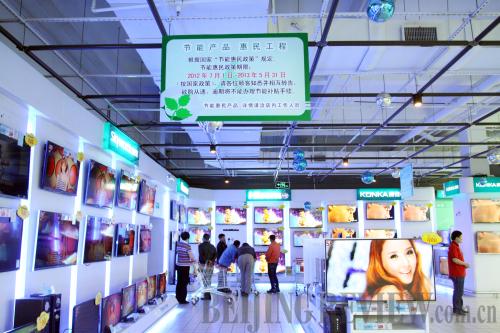Home appliance market sluggish as subsidy expired
Updated: 2013-06-19 09:43
(bjreview.com.cn)
|
||||||||
Li Haiyan is a saleslady in the TV section of a Dazhong Electronics store in Beijing. At 3 pm on June 5, Li was napping on the shop's sofa instead of servicing customers. There was a simple explanation for this: Customers were few and far between, and she hadn't sold a single TV set in three days.
|
 |
|
Consumers inspect flatpanel televisions in a supermarket in Jiashan County, east China's Zhejiang province, on May 30, the last day of the one-year subsidy program for energy-efficient appliances.[CFP] |
Sluggish sales in June were in sharp contrast with sales from the previous month, when Li sold over 200 TV sets.
"In May, there were lots of customers every day," Li said. "I was busy every minute. Although exhausted, I was happy. Now, I'm lucky to sell one set all day."
Life for the television industry dramatically changed on June 1 when the one-year subsidy program for energy-efficient home appliances expired and, as a result, prices were suddenly hiked. A flat-panel TV that was sold at 9,799 yuan ($1,598) before June 1 is now being sold at 10,199 yuan ($1,663)—without a government subsidy of 400 yuan ($65.24).
"If customers don't need those products badly, they won't be willing to pay an additional several hundred yuan. They'd rather wait for the price to drop," said Li.
Designed to drive domestic consumption and cut carbon emissions, the subsidy program for energy-efficient home appliances was rolled out by the Chinese government on June 1, 2012. The program covers five categories of first-grade energy-saving appliances, including air conditioners, flat-panel TVs, refrigerators, washing machines and water heaters. The program offered subsidies ranging from 70 to 400 yuan ($11.4 to $65.2).
Xu Dongsheng, secretary general of the China Household Electrical Appliances Association, said that the end of the program means the home appliance market will be forced to readjust as the market was over-tapped in the past year. How to induce consumers to spend on home appliances without government support has become a challenge for many industry players.
Goals achieved
In a bid to water down the impact from the 2008 financial crisis, the Chinese government pinned its hopes on expanding domestic consumption as a driving force for economic recovery, and it saw household appliances and a means to do so.
In 2008, the central government launched a campaign called "household appliances go rural," in which rural residents received a 13-percent subsidy toward the price of color TVs, refrigerators, mobile phones and washing machines. The program ended on Jan 31, 2013.
In May 2009, the State Council offered subsidies to trade-in home appliances, including TVs, refrigerators, washing machines, air conditioners and computers. The subsidy was 10 percent of the retail price of new appliances. That program ended on December 31, 2011.
The subsidy program for energy-efficient home items is the third of its kind from the Central Government. According to the Ministry of Finance, the program accomplished its goals. During the year, a total of 12.2 billion yuan ($2 billion) was allocated to subsidize 65 million-plus energy-efficient home items. Chinese consumers spent 250 billion yuan ($40.78 billion).

 Michelle lays roses at site along Berlin Wall
Michelle lays roses at site along Berlin Wall
 Historic space lecture in Tiangong-1 commences
Historic space lecture in Tiangong-1 commences
 'Sopranos' Star James Gandolfini dead at 51
'Sopranos' Star James Gandolfini dead at 51
 UN: Number of refugees hits 18-year high
UN: Number of refugees hits 18-year high
 Slide: Jet exercises from aircraft carrier
Slide: Jet exercises from aircraft carrier
 Talks establish fishery hotline
Talks establish fishery hotline
 Foreign buyers eye Chinese drones
Foreign buyers eye Chinese drones
 UN chief hails China's peacekeepers
UN chief hails China's peacekeepers
Most Viewed
Editor's Picks

|

|

|

|

|

|
Today's Top News
Shenzhou X astronaut gives lecture today
US told to reassess duties on Chinese paper
Chinese seek greater share of satellite market
Russia rejects Obama's nuke cut proposal
US immigration bill sees Senate breakthrough
Brazilian cities revoke fare hikes
Moody's warns on China's local govt debt
Air quality in major cities drops in May
US Weekly

|

|







